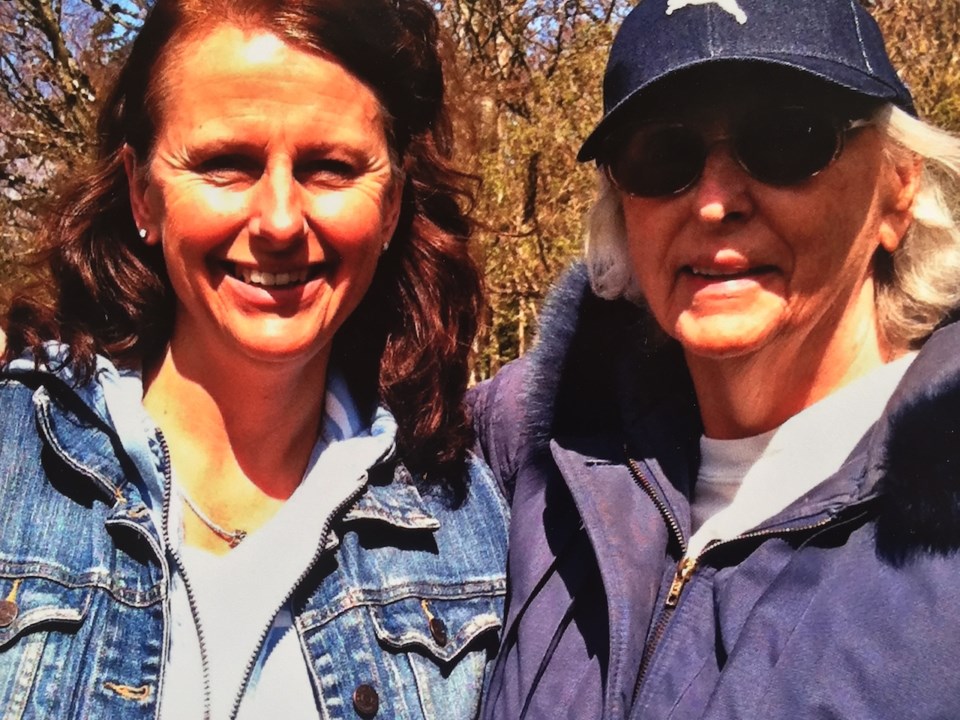Suzanne Allan describes Alzheimer’s as a journey.
It’s one she’s watched her mother take. And now her father is progressing down the same path.
Suzanne one of thousands of British Columbians who care for parents, siblings, spouses, friends, as the increasingly common degenerative disease rips through Canada’s aging population.
Dementia, of which Alzheimer’s is the most common cause, affects 70,000 British Columbians. At least 20 people on Bowen care for a dementia patient.
For Alzheimer’s awareness month (January) Suzanne wants to amplify the dementia conversation, one she finds is still ridden with stigma.
“There’s a lot of covering up and not wanting to even find out in order to get help,” she says. Suzanne stresses the need for early intervention “They still don’t have a cure, but the medications are getting better."
Suzanne has invited Vivian Tsai, the Alzheimer’s Society British Columbia’s North Shore support and education coordinator, to give a couple of workshops on Bowen on January 26. The first, for the general public, is a workshop on how to be dementia-friendly. The second, for caregivers only, is about grieving losses.
But Suzanne’s advocacy isn’t isolated to January.
Throughout the year, Suzanne leads an Alzheimer’s Society caregivers support group.
The last Tuesday evening of every month, the group gathers in Cates Hill Chapel. With warm drinks and goodies in hand, the ever-shifting membership discuss their lives and loved ones.
The islander of 28 years began the group a few years ago as her mother’s Alzheimer’s was progressing. Suzanne tapped into her teacher roots and started learning everything she could about the disease and caring for loved ones.
Run through the Alzheimer’s Society British Columbia, today the group is usually four to six people, but it’s been growing as the disease does.
Ministry of Health statistics show that the number of people living with diagnosed dementia on Bowen Island and in West Vancouver has increased from 804 in 2005-2006 to 1,298 in 2014-2015.
“Sharing in a group where people really get what you’re talking about when other people don’t, it’s the whole premise for a support group, right? ” Says Suzanne. “It’s really powerful.
“Some of the stories are heartbreaking and some are hilarious.
“When I first started...I needed to do something positive it because it was so hard,” she says.
“It’s so tiring. And I think often [caregivers] feel guilty for needing help or wanting respite,” she says. “Admitting how hard it is is tough for a lot of people and so when they can hear other people saying those things, it really, really helps.”
Suzanne has files of information, ranging from how to celebrate the holidays to self-care.
“You’re grieving, small and large losses, all the way along. When you realize that the person can’t do this anymore or they don’t remember that anymore,” she says.
“Further along when they don’t remember who you are, that’s really hard.”
Another one of Suzanne’s files reads “celebrate the good times.” And there are good times.
“I remember back…my mom, we actually have a lot of laughs there,” says Suzanne. “If you don’t laugh, you’ll cry, right?
“Some of the things she said were hilarious.
“And now I’m finding that my Dad can be pretty funny now too. We call it the jolly stage.”
Suzanne estimates that she’s seen between 25 and 35 people pass through the support group, but to maintain confidentiality, she doesn’t keep records past three months.
“We’ve had a few people that have been in the group for a long time, some come and go. Some come for a little while and then that’s enough,” she says. “It’s nice to just raise the awareness.”
On-island, care support can be difficult. Suzanne says that she’s found ways to help people access resources, both private and public, but with no health clinic on Bowen and no assisted living facility, eventually the journey takes people off-island.
“When the time comes and, when and if, that the person has to go into care then it’s that commute to go visit them, which is tough.
“The sad thing is, people don’t go visit [their loved ones] anymore. Because they think ‘will they remember I was even there?’ And they don’t,” says Suzanne. “But I always say well, are you visiting for them? Or for you?
“In that moment, in those moments that you’re there, you’re connecting with them. And you are brightening their day.
“It doesn’t matter if they remember you weren’t there. Because I know they don’t remember that you were there, depending how far along they are.
“I always felt with Mom, she still felt like her,” says Suzanne. “she was still there.
“When she didn’t, couldn’t, say who I was - I felt like she, in her eyes, knew that I was somebody special.”
One of the Alzheimer’s Society’s goals is to encourage dementia-friendly communities: inclusive people, organizations and institutions, aware and welcoming of people living with dementia. Vivian Tsai’s workshops are a step in this direction.
The introduction to dementia workshop is at Collins Hall 1 to 2:30 p.m. January 26. It is a free workshop to recognize dementia and learn strategies to communicate with someone living with dementia, everyone is welcome.
The grieving losses during the dementia journey workshop is for caregivers only, from 3 to 4:30 p.m. It will explore the loss and grief issues of the dementia caregiving experience.
Registration is required (events will be cancelled if demand is low). To register, call Vivian at 604-984-8348 or email [email protected].
Also contact Vivian inquire about or to join the caregiver’s support group. Please note it is only for those caring for people with dementia.



